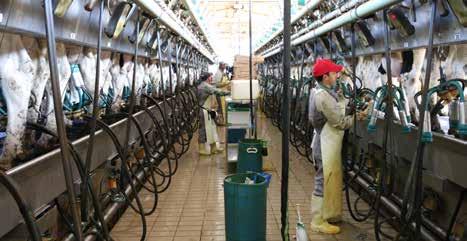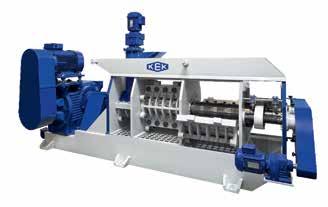
8 minute read
How cows saved carrots
[IMAGE:] Eduardo Sekita, CEO, Sekita Agronegócios (Courtesy Sekita Agronegócios)
“A challenge is an opportunity in disguise.” In the case of the Sekita family, who have been farming in Brazil for the last 80 years, it really was. Their willingness to meet challenges head-on and to try new things has made them one of Brazil’s most successful agribusinesses.
Advertisement
Japanese emigration to Brazil began in 1908 with many immigrants working in the expanding coffee industry. By the onset of World War II, the corridor was quickly closing; 19-year-old Katsuji Sekita packed a few clothes and booked a one-way ticket to Brazil. His future wife, Etsuko, had arrived in Brazil thirteen years earlier. After marrying, they bought a small farm in the state of Paraná, and with their hard-earned knowledge of farming, threw themselves into their work and raising a family.
A cooperative is born
The Sekita’s sons eventually set out on their own, establishing farms in the fertile São Gotardo region; first Tamio, then Seiji and finally the youngest, Makoto, as well as the elder Sekita’s themselves, made the move. It was hard going with lots of challenges, politically and physically, as many areas still required opening-up for farming. However, in time, all three sons were successfully growing coffee, beans, corn and wheat – pooling their resources to hire employees, purchase inputs and negotiate prices for their crops. With a handful of friends and family members, the Sekitas formed their cooperative in 1991, with Makoto serving as CEO for the first 25 years. Carrots and later garlic were brought under cultivation. Eduardo, a third-generation grandson was drawn to the work his uncles were doing, studying agronomy before joining the team in 1999; he has served as CEO since 2015.
The dairy business is expertly managed by another third-generation family member, Leonardo Garcia, Makoto’s son-in-law.
Just add milk
In 2007, with fertilizer reaching upwards of 3,000 to 4,000 kilos per hectare, costs weighed heavily on the group. They identified three options, all of which involved generating manure to alleviate fertilizer costs: breed pigs, raise steers or implement a dairy farm. In discussions with GEA, they decided to add dairy cattle due to the quality and volume of the expected manure and the efficient space requirements of the cows, thanks in part to the GEA Freestall system they would purchase. Although lacking experience, their own determination combined with GEA’s expertise and support, allowed them to get the dairy off the ground by 2008, “Twelve years ago, when we started the dairy business, GEA was the only company that fulfilled all of our aspirations. They gave us the most support regarding animal comfort, milking and issues related to manure,” says Eduardo Sekita.
Reaping the rewards of good stewardship
The dairy has been a clear win-win. It allowed the Sekita cooperative to optimize the land by adding another activity using existing acreage, without reducing vegetable production; optimize the use of their existing machinery; and lower their overall costs while generating a monthly revenue stream from milk sales, thus enabling better cash flow. They have also reduced the corn crop cycle by producing silage for feed and reduced nutrient exports by rotating other animal feed crops, which they’ve also learned to use more efficiently. Overall productivity is higher thanks to the application of manure.
The power of smart waste management
A common complaint leveled at farmers with cows is that the manure is improperly managed and bad for the environment. With the Sekita dairy herd hovering around 1,500 cows, plus 300 dry cows and 2,000 calves and heifers, manure management has been a top priority since day one. The first step in the process is collecting the manure, urine, animal bedding and water from the sprinklers and placing it all in a homogenization tank where the solids are separated from the liquid. The liquid waste then goes to the biodigester, which produces methane gas, which in turn is converted into electricity. The electricity powers the machine that washes the carrots and provides the energy for the cold storage rooms.

After the bacteria have transformed the liquid waste into biofertilizer, it’s applied to the crops via the irrigation system. The solid part of the waste is sent to a composting area – along with other vegetable waste – and eventually applied to the fields to replenish the soil’s organic matter.
Future-proofing success
Not immune to the turbulences in the dairy industry, Sekita Agronegócios depends on the quality of all of its products for its success. “We always work with the best genetics and the best feed to produce the best quality milk in the region. That’s how we achieve differentiated prices,” explains Sekita. “We have a wide range of products and when the price drops in one, others help keep the business viable. It’s all about optimizing resources.”
Today, the Sekita cooperative has more than 40 members. Milk production is around 20 million liters per year (54,000 liters/day) and roughly 100,000 tons of vegetables, raised on 3,000 hectares, are sold each year throughout Brazil, Uruguay and Argentina. The work is carried out by 1,500 dedicated employees.
In 2019, the highly awarded Sekita Agronegócios was again recognized as the fourth largest milk producer in Brazil according to the Top 100 MilkPoint survey. “What we’re proud of is not our ranking,” says Sekita humbly. “We see this as a result of teamwork – and as a team we’re always in search of excellence, which means producing quality food in a sustainable way.”
SCREW PRESS KEK-P0500


For cold pressed vegetable oil High quality for a continuous 24-hour operation
Cotton Ginning Gin Saws / Gin Ribs
Pure quality, hard to beat
Anton-Küppers-Weg 17 | Germany - 42855 Remscheid | +49 2191 84100 | info@keller-kek.de

BMG works closely with the food and beverage sectors to raise hygiene standards throughout the food and logistics chain – from farmers, processors, manufacturers and packagers, to distributors, retailers and consumers.

Bmg provides critical engineering support to ensure safe and efficient food and beverage production and handling during the covid-19 lockdown
BMG – leading engineering solutions specialists - has been authorised to provide engineering components and support services to essential service providers, during the country’s COVID-19 lockdown period. Apart from the supply of necessary engineering consumables and components, industry requires ongoing maintenance and refurbishment services, to ensure efficient productivity, particularly as lockdown levels start to shift towards level 1.
“The BMG team, remains committed to making sure industry is able to continue operating as safely and efficiently as possible during this challenging time. It is absolutely critical - while we are all vulnerable - that extra care is taken by companies to maintain pristine hygiene standards during food and beverage manufacture, storage, packaging and transportation,” says Mark Barbour, Group Product and Sales Manager, BMG.
“We are currently working closely with our customers in all sectors, including the food and beverage industry, to ensure that each plant is well-prepared to resume full production, as soon as the Government allows this. According to authorities, this virus is going to be with us for a very long time, so we all need to be prepared for new, stricter operating conditions. Even small faults in design, operation and maintenance can have huge negative impacts on the quality and safety of food products.
“BMG’s solutions for the food and beverage sector extend from processing, where raw ingredients are transformed, to packaging, where products are enclosed and protected for safe distribution. Our engineering solution services help our customers deliver on food safety and environmental and energy-efficient initiatives, through the supply and support of components for light materials handling, belting products, gearboxes, motors and variable speed drives (VSDs), bearings, seals and gaskets, power transmission components, valves, tools and equipment, as well as fasteners, food-grade lubricants and maintenance chemicals.
“Added to this, BMG – through its ‘Boer Slim’/ Smart Farming initiative - offers local farmers sustainability solutions that focus on effective food production, to ensure there are adequate supplies of fresh foods for an anxious and vulnerable population, during the COVID-19 pandemic.
“This agricultural programme – which involves assisting farmers with the correct use of qualitybranded equipment and the importance of investing in advanced technologies - has never been more important. Our people rely on the dependable supply of fresh food, which our farmers are under enormous pressure to keep producing.”
BMG’s distribution centre in Droste Park, Johannesburg, is operational and fully-stocked during the lockdown period, to help and support customers around the country and into Africa. A comprehensive range of equipment and components comprises bearings, seals and gaskets; power transmission; hydraulics and pneumatics; fluid technology and filtration; drives, motors and controllers; materials handling; fasteners and tools.
Assessment of equipment and plant procedures
A cornerstone of BMG’s service to the food and beverage sector is reliability engineering - starting with an assessment of a plant’s operating processes and budgetary parameters. BMG’s initial design concept is enhanced by technical expertise for product specification, customdesign capabilities for improved productivity, timeous delivery of components, installation and commissioning, as well as support and maintenance of equipment. BMG also offers extensive customer training.
Selection of the appropriate FDAcomplaint equipment
Through BMG’s assistance with careful and accurate product selection, correct installation methods and appropriate care of equipment, substantial savings can be made in reduced maintenance costs and minimal downtime.
The BMG team is also currently assisting essential service customers in other sectors, including water and waste water treatment facilities, coal mines and petrochemical plants. The company also works closely with service providers to power generation and pharmaceutical plants, as well as in ports, rail and road facilities.
Essential service providers requiring assistance are invited to contact BMG at this emergency number 0800022224.










